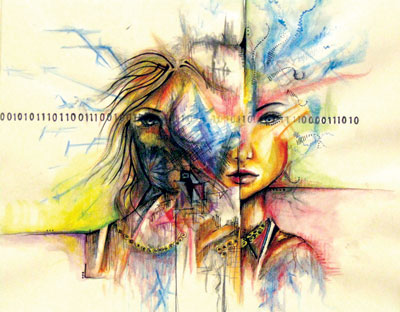All Nonfiction
- Bullying
- Books
- Academic
- Author Interviews
- Celebrity interviews
- College Articles
- College Essays
- Educator of the Year
- Heroes
- Interviews
- Memoir
- Personal Experience
- Sports
- Travel & Culture
All Opinions
- Bullying
- Current Events / Politics
- Discrimination
- Drugs / Alcohol / Smoking
- Entertainment / Celebrities
- Environment
- Love / Relationships
- Movies / Music / TV
- Pop Culture / Trends
- School / College
- Social Issues / Civics
- Spirituality / Religion
- Sports / Hobbies
All Hot Topics
- Bullying
- Community Service
- Environment
- Health
- Letters to the Editor
- Pride & Prejudice
- What Matters
- Back
Summer Guide
- Program Links
- Program Reviews
- Back
College Guide
- College Links
- College Reviews
- College Essays
- College Articles
- Back
Born This Way
The moment you were conceived, your biological sex was determined. You probably received one X chromosome from your mother and one X or Y chromosome from your father, determining whether you were to be male or female. Or maybe you received more or less X’s or Y’s than the typical human. Whatever the case, if your genotype lacks Y chromosomes, you are generally considered female; if you inherited any Y chromosomes, you are considered male. You either have boy parts or girl parts. Simple. Yeah, right.
As soon as parents first discover the sex of their baby, whether from a gender ultrasound or the moment their bundle of joy pops into the world, the first stages of a life molded around the infant’s genitals begin. Before babies can talk, walk, or even think, their rooms are painted pink or blue; they are clothed in frilly dresses and flower headbands, or dinosaur prints and teensy sports jerseys; they are either “Jack” or “Jill,” “Juan” or “Josefina,” “Jamal” or “Jamila.” And even as the children grow into their own tastes, talents, and traits, every year on their birthdays, they unwrap either Barbies or Tonkas, Easy Bake ovens or Legos, ballet slippers or baseball gloves, make-up or video games. Deliberately, unintentionally, or naïvely, but always destructively, parents place upon their children the first straws of gender-related pressures and expectations, undermining their child’s integrity.
And mainstream culture colludes in the crime, injecting childhood, then preadolescence, puberty, youth, and adulthood with poisonous, constraining gender norms. Bit by subtle or shameless bit. Tall, thin, and tan, with long, flowy hair, European features, flawless skin, sultry eyes, long, hairless legs, ample breasts, stylish clothes, gentle voices, and dazzling smiles. Muscular, bronze, athletic, with large pecs and six packs, good hair, strong jaws, rugged features—maybe a five o’clock shadow or tousled hair—and always a certain degree of “manly” cockiness. Representations of the ideal man and woman are inescapable. We see them on TV shows, commercial breaks, magazine covers and ads, billboards, shopping bags; we hear them on the radio and in the movies; we smell their commercial flowery perfumes and musky colognes; we vicariously experience how they touch each other—submissively or aggressively—on the big screen in social, violent, and sexual contexts. Media hammers the nails of society’s gender roles deep into our subconscious and infects us with a virus that makes us believe we should be someone we are not and cannot ever be.
But the images and the virus and the belief are not real! Take me, for example, a real-life human being. My name is Erica, and I have a vagina. What does that tell you about me as a person? Perhaps it correctly suggests how much I love the free and flowy feeling of wearing dresses in warm weather. Or the pleasure I take in the emotional release of tears and laughter. Or my love of dark chocolate. Or how I look forward to being a mother one day. I do. But do my genitals reveal to you my love of pole vaulting, diving, and hot Arizona summers that make me sweat? And that I go without deodorant, because I like my personal scent? Do they illumine the fact that I do not shave any part of my body, but rejoice in the fact that mature women naturally have body hair? Or let you know that, on the average day, breast cages have no power over me? Do they disclose to you my dream of traveling the world? That I will change it? It’s all true. Certainly, sex-related biological processes affect the way I think and act. But how can narrow gender norms do justice to my personal expression of my sexuality, or to the colorful spectrum of mannerisms, appearances, psychologies, and interpersonal behaviors manifested by males, females, and inter-sexual people everywhere?
Feminine: “of woman.” Despite culturally contrived boundaries. As a woman, I am who I am, I act the way I act, I challenge commonly-held conceptions, and I contribute to them. I can’t be defined, and I won’t apologize for not fitting in a little box. Why should I apologize for being who I am? Why should you? We were born this way!

Similar Articles
JOIN THE DISCUSSION
This article has 0 comments.
